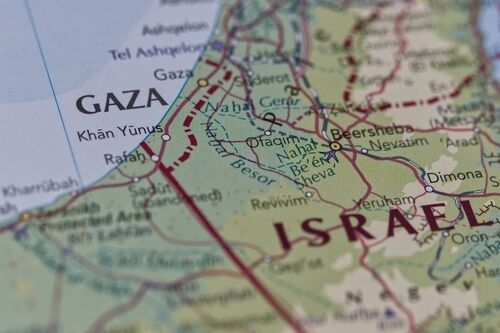Israel strikes Iran: can peace ever be more than an illusion?

Imagine, if you will, that you are walking in the desert. In the distance, you think you can see a beautiful oasis; a lush pool, verdant greenery, shade in the trees. You walk towards it, desperate for some respite from the beating sun. And yet, as you get closer, it never seems to move. Maybe it was never there at all. Maybe it was just a mirage.
As you read news at the moment, you might think this is a little bit like the quest for world peace: it’s just a mirage, an illusion. An ambition akin to chasing after the wind. A hope that seems to be within touching distance, but which is ever elusive.
For all the efforts to bring peace in the Middle East in recent months, overnight, the conflict escalated again, as Israel initiated a direct attack on Iran, ratcheting up the temperature on what had long been a cold war characterised – in the main – by rhetoric, the indirect use of proxy forces, and occasional skirmishes.
What happened?
Last night, Israel launched an attack, targeting key Iranian military leaders and military sites, as well as nuclear facilities vital to Iran’s nuclear programme.
Initial reports suggest that Israel was largely successful in its bid to take out prominent leaders in the Iranian military and nuclear programme with Hossein Salami, commander of Iran’s Islamic Revolutionary Guard Corps (IRGC), Mohammad Bagheri, the army chief of staff, and Gholamali Rashid, the commander of the Khatam al-Anbia joint forces headquarters all killed, as well as six prominent nuclear scientists.
Israel also struck nuclear facilities in Natanz, Iran’s main uranium enrichment facility, as well as an attack-drone base near Tehran, and strikes against Iran’s air defences. Video footage of the attacks indicates that several civilian and residential areas were also hit.
In a video statement, Israeli Prime Minister, Benjamin Netanyahu, stated that “this operation will continue for as many days as it takes”: it seems unlikely that this is an isolated event, but rather a more strategically planned escalation, which is being dubbed Operation Rising Lion.
Netanyahu characterised the attack as “a targeted military operation to roll back the Iranian threat to Israel’s very survival”. Citing Iranian efforts to weaponise and enrich uranium as an unprecedented development, which carries existential risk, Israeli officials set out their justification for the strikes. Given Iran has a long history of calling for Israel to be “wiped of the face of the earth”, defended and endorsed Hamas’ 7th October attacks, and launched 300 rockets and drones in an attack on Israel last year, that threat ought to be taken seriously.
And with the International Atomic Energy Agency (IAEA) recently reporting that Iran had stockpiled uranium with 60% purity (just shy of what is needed to create weapons-grade fuel) and enough enriched uranium to build up to seven bombs, Israel felt the time to act was now. The UN watchdog formally declaring Iran in breach of its non-proliferation obligations on Thursday: Israel took no time to respond with blunt force.
Yet as commentators have been quick to point out, this was not the only option Israel had at its disposal for dealing with Iran’s nuclear threat: the attack came days before US-led negotiations with Iran were scheduled. Trump’s administration had put on record their desire to “avoid a conflict” in favour of an agreement and urged Netanyahu’s government not to “blow” up negotiations. Instead, as the BBC put it, “Netanyahu felt that now was the time, even if the Americans don’t like it”.
Since suffering the brutal terrorist attacks on October 7th 2023, Israel has sought to completely demobilise and eradicate all hostile actors in the region: it sees Iran as the primary culprit due to its funding and resourcing of proxies such as Hezbollah, the Houthis, and Hamas, all of which wish to destroy Israel.
It is in large part due to the success of Israel’s efforts in this arena that it felt able to carry out these attacks. With Hamas struggling in Gaza, Hezbollah largely neutralised, and the collapse of an Iran-sympathetic regime in neighbouring Syria, Israel has more freedom to go on the attack.
What next?
Iran has branded the attacks a “declaration of war” and “called on the [UN] Security Council to immediately address this issue”. It has also retaliated, sending over one hundred drones towards Israel and vowing Israel will face “severe punishment”.
Israel has moved quickly in anticipation of Iran’s response, warning civilians to take to shelter and stockpile supplies for several weeks, as well as shutting public institutions. At present it seems as if Iran’s initial barrage of drones have largely been neutralised, although this will not be the last we see from the Iranian regime. Warnings from the Israeli Defence Forces (IDF) suggest there will be grave costs, perhaps “different from what we are used to”.
Several Middle Eastern countries have come out condemning Israel’s actions, and European leaders have urged restraint and called for de-escalation. The coming days will tell whether things build into a full-blown conflict or whether the two sides will head back to the negotiating table.
US-Israeli relations appear mixed: Secretary of State Marco Rubio put distance between the US and Israel, labelling Israel’s actions as “unilateral” and stressing “We are not involved in strikes against Iran and our top priority is protecting American forces in the region”. But the US has committed to defending both itself and Israel from any Iranian retaliation, and President Trump has used last night's events to try and force Iran to the negotiation table before “there is nothing left”, warning them to make a deal before they suffer “even more brutal” attacks. There is clear agreement from both the US and Israel that “Iran cannot have a nuclear bomb”.
While conflict is never good, it is sometimes necessary. Iran is hardly a place of peace and tranquillity, having openly talked of the wholesale destruction of Israel and funded and trained terrorist organisations across the Middle East. To enable a regime such as this to build up nuclear capabilities does not serve anyone interested in global peace.
That being said, Israel’s claims also should be viewed with a degree of scepticism. Members of the Israeli government have issued their own dehumanising rhetoric, and while Netanyahu remains in charge, there will always be commentators suspicious that his military actions are simply a matter of political self-interest.
Thinking Christianly about the state of our world
Another week, another scene of destruction, violence, and death. Another week under the sun in which peace is nothing but a dream, an unobtainable chasing after the wind.
Country music singer Jordan Davies,has a song titled “Good News Sold” in which he writes “the world wouldn't seem so bad, if good news sold, we'd be buyin' everything they had, and we'd all sleep a little bit better tonight”. We all like good news.
But this week alone we’ve had racist rioting in Northern Ireland, a catastrophic plane crash in India, and the escalation of conflict in the Middle East. Our world is full of bad news. We would not be human, if we did not feel some sense of angst, some level of fear, some sort of despair at the state of our world. A world in which only good news sold wouldn’t be a truthful one. These times are not times of peace and stability.
The Bible tells us that creation has been subjected to frustration, that the fall of Genesis 3 has wrought destruction on all creation and has brought disharmony where once harmony reigned.
It is easy to view our times as atypical. As particularly nasty, brutish, and short, and therefore to justify extreme and extraordinary measures in our response. But the Bible tells us we do not live in exceptional times. This is life under the sun: there is “a time for love and a time for a hate; a time for war and a time for peace” (Ecclesiastes 3:8).
But living in such times has meant that we are beset by angst, cynicism, and despair, which perpetuate the very issues we decry. Having lived before through times of relative peace and prosperity, our increasing awareness of the brutality of life is doing dangerous to our hearts.
Here are three common ways in which we might find ourselves responding to what is going on:
1. We grow numb.
Who among us hasn't experienced fatigue or numbness at the sheer number of horrors that pass across our screens each day? For many of us that is simply the easiest way to cope.
And in some ways, there is something right about this. We aren’t designed to carry the weight of the world on our shoulders each day: we are mere creatures.
Yet to numb ourselves to the destructive effects of sin is not something we should strive to do. It risks denying our sense of justice, our sense of right and wrong, and our sense of the truth, those imprints of the divine image which live inside us all. That is not how we are meant to be.
2. We grow fearful.
To open yourself up to truly feeling all that we see before us is to experience near constant anxiety about the sheer number of risks and threats that could turn your life, your family, your nation upside down at any one moment.
Again, there is something right in this. We recognise the fragile nature of human existence. As C.S. Lewis said, “civilisation is a rarity, attained with difficulty and easily lost”.
Yet to give in to fear is to overlook that we believe in a God who clothes the lilies of the field and feeds the birds of the air, who sustains creation and does not simply hand it over to the destructive forces of sin, but who brings the sunshine and who brings the rains.
3. We cast ourselves upon God.
To grow hard of heart or to grow anxious carries danger. A danger that we become uncaring and selfish. A danger that we lash out in fear or anger. But there is a third way: we can “come and see what the Lord has done”.
I find Psalm 46 helpful in times like these. It doesn’t shy away from the brutal realities of life under the sun. It speaks of a world in which the earth gives way, and mountains fall into the heart of the sea. It speaks of nations in uproar and kingdoms failing.
But it also doesn’t give in to numbness or fear. Rather it urges us to come and see what the Lord has done, for He is our refuge and strength, an ever-present help in trouble, a source of security and refreshment, and the one who can make wars cease to the ends of the earth.
Looking at the headlines would make anyone feel like peace can only ever be a mirage, an illusion.
But this weekend, look at the Lord: the ‘Prince of Peace’. Be still and know that He is God. He will be exalted; His justice and righteousness will come. Find security and encouragement in Him for the God of Jacob is our fortress, and know that one day he will bring his peace over all the earth.
And as you gaze at God, pray for those caught in the midst of the destruction, that they might know there is a day when wars will cease, that that day will come quickly, and that they will put their hope in the Lord Almighty, our refuge and strength, an ever-present help in trouble.
We can grow numb. We can grow fearful. Or we can pray.






